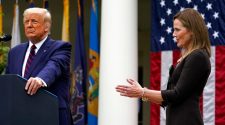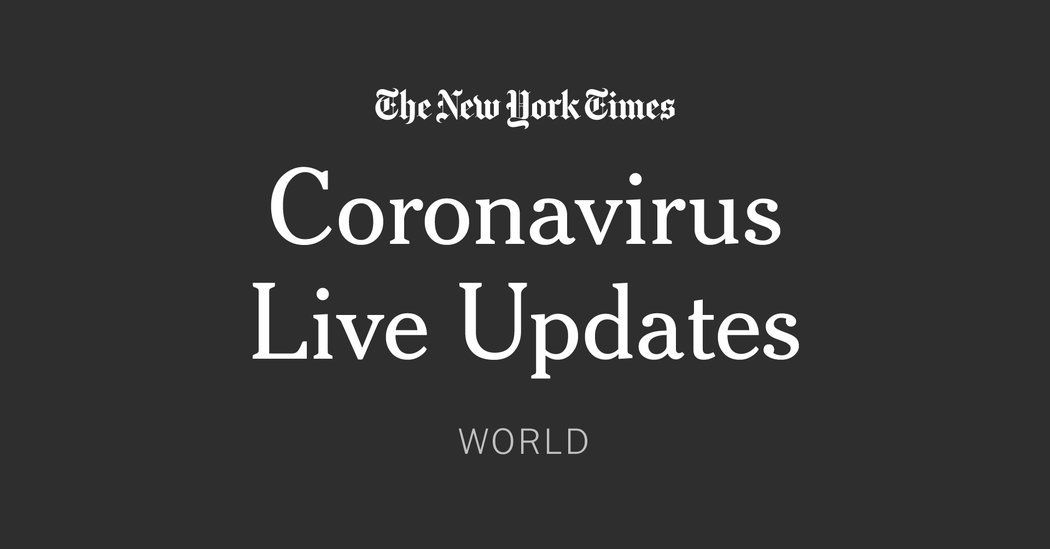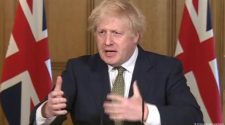Germany’s infection rate falls, a sign that it is getting the virus under control.
As Germany moves to ease restrictions under the pandemic, its public health institute said the country’s rate of coronavirus spread had dropped below a crucial threshold, a sign that the contagion was coming under control.
On average, each infected person is spreading the virus to 0.7 other people, officials said. That means that fewer people are catching the virus than are getting over it.
As long as the figure stays below one, the number of active cases is declining, and the burden on the health care system is easing.
“Since April 12, we have recorded more recoveries than new infections,” Jens Spahn, Germany’s health minister, said at a news conference on Friday. “That is an important and encouraging development.”
Scientists around the world have estimated that without social distancing, quarantines of the ill and other precautions, each person with the new virus would give it to about two others — a formula for exponential growth.
The lower infection rate does not mean that Germans can return to their pre-coronavirus lifestyles, said Lothar Wieler, president of the Robert Koch Institute, the government’s public health and epidemiology center.
He cautioned that in some parts of Germany, the infection rate remained much higher, and stressed that the rate is only one point in a range of data being continually assessed to make decisions on regulation of public life.
“This virus is in our country, and it will remain in our country,” Dr. Wieler said. And the situation, he said, “can change at any time.”
While children have been largely spared the worst of the Covid-19 illness, the United Nations has warned that the social and economic fallout of the pandemic “risk being catastrophic and amongst the most lasting consequences” for the young.
“I appeal to families everywhere, and leaders at all levels: protect our children,” the U.N. secretary general, Antonio Guterres, said in a video statement announcing the report.
The report, released on Thursday, found that the pandemic was turning into “a broader child-rights crisis” that would play out unevenly around the world.
“All children, of all ages, and in all countries, are affected,” it said. “However, some children are destined to bear the greatest costs.” The report cited “children in the poorest countries, and in the poorest neighborhoods, and for those in already disadvantaged or vulnerable situations.”
Polio vaccination campaigns have been suspended. Measles immunization campaigns have stopped in at least 23 countries,” according to the report. “And as health services become overwhelmed, sick children are less able to access care.”
Infant mortality is likely to rise, the report said.
School closures reduce many children’s nutrition and safety. Mr. Guterres said that 310 million schoolchildren, nearly half of the world’s total, rely on schools as a daily source of food.
In addition, with children at home and families under increasing stress, he said, “children are both victims and witnesses of domestic violence and abuse.”
Texas will let all stores in the state open next week for “retail-to-go,” permitting pick-up and delivery but not in-store shopping. Minnesota will allow golf courses and driving ranges to reopen this weekend. Vermont will let its farmers’ markets reopen on May 1.
Governors around the United States began announcing plans to ease restrictions in their states on Friday, a day after President Trump, who has been impatient to restart the economy, issued a set of guidelines offering suggestions of when and how to reopen.
Just as much of the country entered life under quarantine in patchwork fashion, it is poised to ease restrictions the same varied way, even as cases continue to surge in some parts of the country and public health experts warn that states and communities do not have enough testing to identify future outbreaks or the contact-tracing to contain them.
Even before reopening begins, the process is highly politicized. Conservative groups have organized demonstrations against Democratic governors in three swing states over constraints on public life, though they are not the only states to have imposed them.
Mr. Trump egged on the protests on Friday, tweeting “LIBERATE MICHIGAN!” “LIBERATE MINNESOTA!” and “LIBERATE VIRGINIA, and save your great 2nd Amendment. It is under siege!”
The tweets contrasted with his message on Thursday, when he told governors “you’re going to call your own shots,” and said that reopening would proceed “one careful step at a time.”
After saying repeatedly that there was plenty of testing — a claim many governors, like health experts, have refuted — Mr. Trump tweeted, “the States have to step up their TESTING!”
Mr. Trump also took aim at Gov. Andrew M. Cuomo of New York, a Democrat.
During a televised briefing in which the governor once again appealed for more federal help, the president tweeted that Mr. Cuomo “should spend more time ‘doing’ and less time ‘complaining.’”
Asked to comment, Mr. Cuomo said, “If he’s sitting at home watching TV, maybe he should get up and go to work.”
This year’s celebration of Canada Day in Ottawa will — like so many occasions derailed by the coronavirus — take place as an online-only affair, Prime Minister Justin Trudeau’s government announced on Friday.
Often referred to as the nation’s birthday, Canada Day, July 1, is one of the country’s major national holidays, and ordinarily draws crowds from across the country to Ottawa, the capital.
A concert stage is built in front of the Parliament buildings for performances by musicians, actors and comedians throughout the day and evening, and the program culminates in a fireworks show. Other events are held elsewhere in the city and across the Ottawa River in Gatineau, Quebec.
This year, the main stage was to be in a park because of construction work in front of the Parliament buildings.
Steven Guilbeault, the minister of Canadian Heritage, said on Friday that the government will work with artists and performers to come up with a virtual approximation of the celebrations.
“Together, we are meeting one of the greatest challenges in our history, and this year more than ever, Canada Day will highlight the strength that unites us,” Mr. Guilbeault said.
Mr. Trudeau has repeatedly suggested that restrictions on public gatherings would remain in place for at least several more weeks and perhaps months.
Summer is a key time for celebrations and festivals in Canada where the season is relatively brief. Quebec, effectively canceled summer last week by announcing that all indoor and outdoor festivals, cultural events and most sports events would be canceled until the end of August.
Canada Day marks the date in 1867 when three British provinces were united as a largely independent Dominion of Canada, with its own Parliament.
Julie Price, an American living in India, was trying to buy food. But when she reached a grocery store in the city of Hyderabad late last month, a guard blocked her from entering. A bystander took her picture, said that foreigners were not allowed in and threatened to call the police.
A crowd had gathered, and she rushed home.
“I was so scared that I did not leave my apartment for 20 days,” said Ms. Price, a Tennessee native who arrived in India in January for a long work trip. Her experience is not unusual.
In recent weeks, Americans and Europeans in India have been evicted from hotels and apartments, aggressively questioned on the streets and forced to ration food in remote beach towns amid what appears to be a rise in xenophobic incidents during the pandemic. Many of India’s initial cases emerged from foreign travelers, and some South Asians believe that Westerners carry the coronavirus.
After India declared a nationwide lockdown on March 24, shutting most shops and halting international flights, Ms. Price, who runs a branch of her graphic design business from Hyderabad, hunkered down in a rented apartment.
“This is the first time I’ve ever been treated rudely here,” Ms. Price said. “It really upset me. I have to eat, too.”
Mahesh Muralidhar Bhagwat, a police commissioner in Hyderabad, said the incident was under investigation. He said Indians who blocked others from buying food on the basis of nationality or ethnicity would be met with an “iron fist.”
“The police do not tolerate this and legal action will be taken,” he said.
The latest in science: Medical ingenuity is abounding where ventilators aren’t.
As the coronavirus rages across the globe, ventilators that pump oxygen into the lungs of critically ill patients have been embraced as the best hope for saving lives.
In the United States, fears of ventilator shortages have unleashed a wave of experimentation that is leading to some promising alternatives to help sustain patients.
Some hospitals have been using CPAP and BiPAP machines, designed for people with sleep apnea, to keep coronavirus patients breathing without having to resort to intubations and ventilators. Engineers have transformed hooded hair salon dryers into personal negative pressure chambers that deliver oxygen and limit the spread of aerosolized virus, lowering the infection risks for health care workers and other patients.
Pulmonologists across the country have been turning to a remarkably simple intervention: flipping patients onto their stomachs, which markedly improves oxygen levels for those in respiratory distress.
Doctors say these and other ad hoc interventions have allowed many hospitals to weather the surge of desperately ill patients in recent weeks, and may have helped stave off the dire ventilator shortages and rationing that some had feared.
“Some of these are battlefield interventions that we would not normally use in hospitals, but this crisis has been an incredible spur for creativity and collaboration,” said Dr. Greg Martin, a pulmonologist in Atlanta and the president-elect of the Society of Critical Care Medicine. “The beauty of this is that we’re learning a lot and hopefully some of this will translate to things we can use in the future.”
Nearly half of the roughly 2,300 sailors from France’s Charles de Gaulle aircraft carrier group have tested positive for the coronavirus, the French defense minister said on Friday, amid growing questions over the military’s handling of the outbreak.
“It’s an issue that keeps me up at night,” the minister, Florence Parly, told a video hearing of the defense committee of France’s lower house of Parliament.
The Charles de Gaulle, France’s flagship nuclear-powered aircraft carrier, returned to its Mediterranean home port of Toulon on Sunday, after the outbreak emerged. There were 1,760 sailors aboard the carrier itself, Ms. Parly said, and several hundred more on support vessels, including a frigate and a refueling ship.
Almost all the sailors have been tested, Ms. Parly, with 1,081 testing positive and results pending for another 929. Nearly 550 sailors are symptomatic, she said, and 24 are hospitalized in Toulon, one in intensive care.
The carrier’s outbreak recalls the one on the U.S. aircraft carrier Theodore Roosevelt, which became a debacle for the U.S. Navy.
“We hear the doubts, we hear the questions, there are many on the origin of the contamination,” Ms. Parly acknowledged at the hearing. She said that medical and military investigations were seeking to determine how the outbreak started and whether it was adequately handled, and that the conclusions would be made public.
One hypothesis, Ms. Parly said, is that the outbreak was tied to a mid-March stop in Brest, on France’s Atlantic coast. Traditional family visits to the ship were canceled, she said, but sailors were allowed to disembark.
Ms. Parly forcefully denied media reports earlier this week suggesting that the defense ministry had denied a request by the carrier’s commander to end the mission on the stopover in Brest, which lasted from March 13 to 16, just before France went on lockdown to stop the spread of the virus.
China’s top leader, Xi Jinping, has used the coronavirus pandemic to shore up his political power at home, but the tools the Communist Party has exploited to do this are threatening China’s international standing.
Internationally, China has demanded praise of Mr. Xi from countries receiving its experts and supplies, and has vented at the world a vitriol usually reserved for domestic audiences, provoking anger.
China’s embassy in France posted a statement on its website accusing Western governments of failing to protect their most vulnerable, letting nursing home residents die abandoned. A Chinese Foreign Ministry spokesman floated a conspiracy theory that Americans might have introduced the virus to China.
In the past week, officials in France, Britain and nearly two dozen African nations have rebuked Chinese government actions. China has been accused of hypocrisy, hubris and obfuscating the virus’s origins.
Japan has pledged to help companies move production out of China because of concerns about the country’s reliability. And President Emmanuel Macron of France questioned whether China’s heavy-handed methods were a model for democracies to follow.
China’s state media portray Mr. Xi as a forceful yet benevolent leader, and in calls with world leaders, he emphasizes global unity and China’s willingness to help. In Beijing’s official accounts of those calls, other leaders praise him effusively.
While lashing out at anti-Chinese sentiment around the world, China has turned a blind eye to — and even, critics say, encouraged — xenophobia at home. China has restricted entry from abroad, allowing it to portray the danger as a foreign one, even though many of those returning from other countries were Chinese citizens.
The European Union’s top foreign policy official, Josep Borrell, recently accused China of stoking a “battle of the narratives” and stigmatizing Europeans. After member nations complained about substandard medical supplies bought from China, the bloc made a point of thanking Taiwan for its donation of masks, a gesture that would previously have been considered too risky for fear of offending Beijing.
As France sought clues last month on how to tame the coronavirus, experts looked at one tool that has been central to the strategy of some Asian nations: digital tracking. Citing threats to “individual liberties,” the powerful interior minister dismissed it as alien to “French culture.”
But three weeks later — and after a tenfold spike in deaths — French culture could be changing.
President Emmanuel Macron, who this week extended a nationwide lockdown by at least another month, said his government was considering using a smartphone tracking app that would inform people if they have come in contact with an infected person.
Such steps are particularly fraught in Europe, the continent with the world’s toughest online privacy rules. But as the country struggles to find a way out of a lockdown that is entering its second month and has kept a population of 67 million confined to their homes and paralyzed its economy, options that once seemed unfathomable have steadily become more palatable.
Recent experience in Asia shows that comprehensive tracing of infection chains, along with aggressive testing, has proved critical to fighting the pandemic. And the situation is calling into question a host of Western assumptions, including about the use of digital tracking and the wearing of face masks.
Those in France who argue in favor of allowing the app’s intrusiveness say that it is fair to infringe on people who are infected rather than inhibit the freedom of society as a whole. But there are concerns that the app, relying mainly on a sense of civic duty, will be so watered down in France that it will prove ineffective.
On Wednesday, 350 pupils returned to classes at the Logumkloster District School for the first time in a month, as Denmark became the first country in the Western world to reopen its elementary schools since the start of the coronavirus pandemic. The move has turned the Danish education system into a laboratory for whether and how schools can function in an age of contagion.
“It is a new world,” said Tanja Linnet, the school’s head teacher, as pupils arrived on Thursday morning. “We used to make plans for if there was a terrorist attack here, but never this kind of attack.”
To stop the spread of infection, parents were not allowed inside. Teachers were not allowed to gather in the staff room. The children each had their own desks, two yards away from their nearest neighbor. During recess, they could play only in small groups. And by the time the school shut at 2 p.m., they had all washed their hands at least once an hour.
“We usually jump and hug and fight and give each other high fives,” said Zakarias Al-Tibi, 10, pointing at his best friend, Jannik. “But we can’t do that anymore.”
The World Health Organization has cautioned against reopening societies too quickly for fear of reviving the pandemic before it can be stamped out. The number of active cases in Denmark has dipped in recent days; it has recorded more than 7,000 infections and 336 deaths.
Many parents are conflicted. Some created Facebook groups protesting the reopening of schools, fearing that their children were being sacrificed to save the Danish economy. But by and large, parents at Logumkloster have been won over by how the head teacher and her staff refitted the school for safety.
Officials placed the new tally at 3,869 deaths from the coronavirus in the central Chinese city of Wuhan, an increase of 1,290, or 50 percent, from the previous figure. The number of confirmed infections in the city was also revised upward to 50,333, an increase of 325.
Officials in Wuhan said the revised death toll included those who died at home in the early days of the outbreak, as well as deaths that had not been properly reported by hospitals or registered on death certificates.
The move appeared to be a response to growing questions about the accuracy of China’s official numbers and calls to hold the country responsible for what has become a global health crisis. Dominic Raab, Britain’s foreign secretary, told Reuters on Thursday that China would have to answer “hard questions” after the crisis about how the pandemic came about and how it could have been stopped earlier. President Emmanuel Macron of France told The Financial Times that “there are clearly things that have happened that we don’t know about.”
The C.I.A. has also told the White House that China’s official figures are vastly understated, though it does not know the exact numbers, current and former American intelligence officials say.
Widespread reporting has shown that the Chinese authorities initially mismanaged and concealed the extent of the epidemic before eventually swinging into action in late January to halt the spread of the virus. Beijing maintains that it has been transparent in its communications about the epidemic from the beginning.
Coroners in some areas are overwhelmed. Funeral homes in virus hot spots can barely keep up. Newspaper obituary pages in hard-hit areas go on and on. Covid-19 is on track to kill far more people this year in some countries, including the United States, than the seasonal flu.
But determining just how deadly the new virus will be is a key question facing epidemiologists.
As the virus spread across the world in late February and March, the projection circulated by infectious disease experts of how many infected people would die seemed dire: around 1 percent, or 10 times the rate of a typical flu.
But according to various unofficial Covid-19 trackers that calculate the death rate by dividing total deaths by the number of known cases, about 6.4 percent of people infected with the virus have now died worldwide.
The rates vary widely by geography. In Italy, the death rate stands at about 13 percent, and in the United States, around 4.3 percent, according to the latest figures on known cases and deaths, while in South Korea, where widespread testing helped contain the outbreak, 2 percent of people who tested positive for the virus have died.
But all of those percentages have a basic flaw: No one really knows how many people have the virus. Counting deaths has been far from perfect, but it is easier than counting infections, and some countries are doing far more testing than others.
In other words, it is not clear what the apparently varying death rates around the world really mean.
Virology experts say there is no evidence that any strain of the virus, officially known as SARS-CoV-2, has mutated to become more severe in some parts of the world than others.
Simon Coveney, the country’s foreign minister, said that Ireland “strongly supports” the organization’s effort to lead the global response to the coronavirus and would contribute 9.5 million euros, about $10.2 million, this year toward that mission.
“So many countries rely on United Nations expertise and capacity to save lives,” he wrote on Twitter.
Mr. Trump said on Wednesday that the United States would freeze funding to the health organization while his administration reviewed its handling of the crisis, accusing it of promoting disinformation about the scale of the disease’s threat.
Critics say the Trump administration was slow to take the pandemic seriously and lagged on facilitating wide-scale testing to help fight the outbreak.
The United States is the largest funder to the W.H.O., and last year contributed about $553 million of the agency’s $6 billion budget.
The decision to suspend funding provoked criticism from other countries, with officials warning that pulling support from an already underfunded agency could have severe consequences. And nations declared their continued support.
Britain also said it would continue to fund the organization, which it says has an important role in the response to the outbreak. “It is a global challenge, and it’s essential that countries work together to tackle this shared threat,” a Downing Street spokesman said on Wednesday.
Most children in Spain haven’t been outside in five weeks. Unlike in France, Britain and even Italy, children are forbidden to even take a short walk on the street or exercise near their homes.
Such confinement measures, the most stringent in Europe, have left parents, health experts and politicians alarmed over the potentially harmful consequences that the confinement will have on children’s physical and mental health.
“If adults can go for a walk with a dog, and now some nonessential economic activities are resuming, why do our boys and girls have to keep waiting?” Barcelona’s mayor, Ada Colau, wrote on Facebook, urging the authorities to “free our children.”
Calls to ease the lockdown for children have intensified in recent days, and the Madrid region may allow children under 14 to go out for an hour once a day by the end of the month.
Confinement can lead to eating and sleeping disorders, depression and aggressive conduct, among other troubles, child experts say, all of which can have a critical impact on a young person’s development. The ban on going outside has been worse for children who live in cramped apartments without a balcony or outdoor space.
Parents have reported that their children have lost interest in activities, cried a lot or become apathetic, and some in Spain who have tried to take their children out for a short walk said the young ones have refused.
“I think I’m just afraid of the street now,” Lia Cenador, 9, said of her refusal to go out after her mother offered her a chance to breathe some fresh air in Barcelona. “I’ve forgotten what it’s like to be on the streets.”
Singapore announced a record jump in coronavirus cases for the second day in a row on Thursday, with most of the 728 new infections coming from crowded dormitories for migrant laborers.
The rise was a stark demonstration of the risks faced by low-wage migrants who have built the modern city-state, bringing focus to their poor living conditions. More than 1,050 cases were linked to the residences on Wednesday and Thursday, leading the government to promise changes in how the migrants, many from India and Bangladesh, are treated.
The health ministry said on Thursday that the surge in newly identified cases was in line with its “continued efforts to actively test and isolate the infected workers.”
After weeks of low transmission numbers, Singapore began recording a rapid rise in cases in March, as travelers from Europe and the United States brought the virus with them. By Thursday, the health ministry said it had not registered any imported cases for a week.
Israel is readying a “pilot program” to ease back into normal life, beginning with the “controlled and measured” reopening of businesses in certain sectors, but officials still need to hash out details, Prime Minister Benjamin Netanyahu said.
With more than a million Israelis idle — the unemployment rate is 26 percent — Mr. Netanyahu said the finance ministry was mapping out a plan to allow select businesses to resume operations and would bring it to his cabinet for approval on Saturday night.
Some special-education students will also be able to restart private lessons, and people will be permitted to exercise within a 500-meter radius of their homes. Until now, Israelis had been constrained to 100 meters from their front doors.
The announcement came hours after about 1,000 people protested on Thursday night in Tel Aviv against Mr. Netanyahu, the indicted head of a caretaker right-wing government. The demonstration prompted Mr. Netanyahu’s son Yair to write on Twitter that he hoped that “the elderly people who die following this protest” were left-wingers. He later deleted the post.
Separately, Muslim officials said that Al-Aqsa mosque would remain closed throughout Ramadan, the monthlong holiday that begins on April 23.
The coronavirus outbreak has brought China’s extraordinary, nearly half-century-long run of growth to an end — a stark reminder of the enormous task ahead for world leaders trying to restart the global economy.
China’s National Bureau of Statistics said on Friday that the country’s economic output shrank 6.8 percent from January through March compared with the same period last year. It is the first economic shrinkage acknowledged in official statistics since 1976, when the country was in the final days of the Cultural Revolution, a national spasm of urban violence and torture.
The numbers reflect China’s dramatic efforts to stamp out the coronavirus, which included shutting down most factories and offices in January and February as the outbreak sickened tens of thousands of people.
China is now trying to restart its vast, $14 trillion economy, an effort that could give the rest of the world a much-needed shot in the arm. But the spread of the virus to Europe and the United States has sharply cut the world’s appetite for China’s goods. That could lead to factory shutdowns and worker furloughs.
China’s National Bureau of Statistics confirmed last month that domestic industrial production, retail sales and investment all suffered record double-digit drops in the first two months of this year compared with the same period of 2019.
“This year is difficult — some have lost their jobs, some cannot find work to do,” said Liu Xia, a fruit vendor from a village on the outskirts of Beijing. “Those who do go to work and those who are still in business are greatly affected.”
Beijing’s options for dealing with the crisis are limited. Its economy has become too big and complex to easily restart as it did in 2008 when it unveiled a plan to spend more than half a trillion dollars. And years of easy lending have left local governments and state-run companies mired in debt.
The latest fake cure for the coronavirus making the rounds: drinking Cognac. This week, Mike Mbuvi Sonko, the governor of Kenya’s capital, Nairobi, included small bottles of the alcoholic drink as part of care packages delivered to the city’s poor.
Cognac, which he said would be distributed only to adults, “should act as a throat sanitizer. It kills the virus,” he said in a video while wearing sunglasses, a mask, a cap and a shield.
The local operation of Hennessy, the French Cognac distiller, rebutted Mr. Sonko’s claim in a statement, saying that its alcoholic beverages do not protect against the virus. The company urged people to wash their hands, practice social distancing and stay at home.
As with other regions, myths and fake news about the virus and how to fight it have been circulating across Africa, with many shared widely through social media and applications like WhatsApp. The purported treatments have included drinking black tea with no sugar in Kenya, shaving beards in Nigeria and boiling and drinking aidan fruits in Ghana. The authorities in Burundi have cited divine intervention to explain the delayed arrival of the virus in the continent. In Tanzania, President John Magufuli has declined to close churches during the pandemic, saying that the coronavirus “cannot survive in the body of Christ; it will burn.”
As of Thursday, there were 17,247 cases and 910 deaths from the coronavirus across Africa, according to the Africa Centers for Disease Control and Prevention.
Reporting was contributed by Norimitsu Onishi, Constant Méheut, S.M. Bilal, Kai Schultz, Melissa Eddy, Ceylan Yeginsu, Patrick Kingsley, David Halbfinger, Andrew Jacobs, Steven Lee Myers, Marc Santora, Aurelien Breeden, Abdi Latif Dahir, Elian Peltier, Megan Specia, Yonette Joseph, Tess Felder, Daniel Victor, Amy Qin, Paul Mozur, Rick Gladstone, David Halbfinger, Elaine Yu, Keith Bradsher, Kate Taylor and Ernesto Londoño.


















